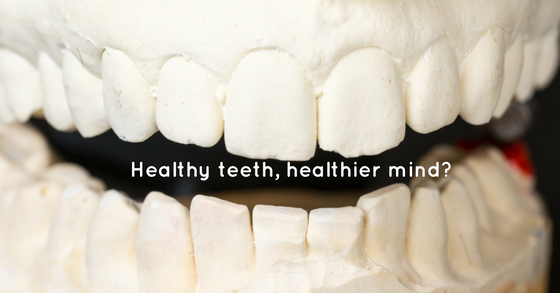“Does Poor Oral Health Contribute to Cognitive Decline?”
By Meredith Kimple
From our first trips to the dentist as children, we are drilled with reminders to brush our teeth, floss daily, and stay away from candy (to our dismay). Oral health is a component of our wellbeing that we maintain largely out of habit, and is so entrenched in our routine that we often give little thought to it. All of the careful brushing, polishing, flossing, and swishing is done to preserve the beauty and utility of our teeth.
But recent studies suggest there may be a more pressing reason to take care of our smiles.
There is evidence that a positive correlation exists between poor oral health and a greater degree of cognitive decline in the elderly. In one study, the presence of gum disease corresponded to a six-fold increase in the speed of cognitive decline among participants. The theory is that the bacteria generated by gum disease and poor oral hygiene triggers the body’s inflammation system; in defending against foreign bacteria, inflammatory molecules also target the human body. Previous studies have suggested that such attacks on the body, and on the brain, lead to an increased rate of cognitive decline in individuals with dementia and Alzheimer’s.
Generally, tooth loss and gum disease become more prevalent as we age, so even greater care must be taken when performing oral hygiene-related tasks. This can be difficult for our older loved ones for a number of reasons, but for those who have dementia or Alzheimer’s, maintaining oral health may be neglected entirely. If the theories that link gum disease with cognitive decline are, in fact, accurate, then this creates a dangerous cycle. If those with dementia and Alzheimer’s neglect their oral health, gum disease is all the more likely, and if the bacteria leads to inflammation, they may suffer more rapid cognitive decline. This decline may make taking care of their teeth even more difficult for them, leading to further instances of gum disease and tooth loss.
And the cycle repeats.
While medical professionals do see the potential in future studies of this correlation, at the moment there is not enough consistent evidence to suggest the veracity of these theories. However, we know that the bacteria produced by oral infections can enter the bloodstream and cause harm to the body, especially to the cardiovascular system. When a loved one is diagnosed with Alzheimer’s or dementia, preserving their oral health may not be our first concern. But maintaining it can have positive effects on their overall wellbeing.
Whether you are the primary caregiver or you utilize at-home assistance, here are some ways to help keep your loved one’s gums and teeth healthy:
- Brush teeth at least twice a day. This may be difficult depending on what stage of the disease your loved one is in, but anything is better than nothing. Using an electric toothbrush may make things easier and remove plaque and food particles more effectively. If using toothpaste is too challenging, use a wet toothbrush rather than stopping altogether.
- Floss daily if possible. Plaque and food build-up between teeth can be hard to reach with a toothbrush and can lead to gum disease. Try using a flossing tool rather than string; this will make it easier for your loved one to do it on their own or for you to do it for them without being too invasive.
- Use mouthwash regularly. Make sure they do not swallow it, and if there is a danger that they might, even swishing and rinsing their mouths with water can be beneficial for cleaning out food particles.
- Make regular dental appointments. Take your loved one to the dentist often, and discuss any concerns you have about their dental health. Their dentist will be able to spot any early signs of gum disease, and can devise a treatment plan with you.
Pay close attention for these signs of gum disease, and make an appointment immediately if you notice any of the symptoms.
It may be that gum disease and tooth loss have no bearing on cognitive decline, but for our loved ones who have dementia or Alzheimer’s, maintaining oral health is vital. If they begin to lose teeth, chewing can become even more difficult, and dentures may add to their discomfort. The bacteria produced by gum disease can trigger the body’s inflammation system and can have a negative impact on their cardiovascular health.
The earlier we take preventative measures to maintain our oral health, the better for our overall health. For our older loved ones, caring for their teeth may become more difficult for a variety of reasons, and they may neglect their typical oral routine. Suddenly forgetting to brush their teeth may be an early indicator that they are experiencing cognitive decline, and so it is of the utmost importance that we take these changes in our loved ones seriously.



